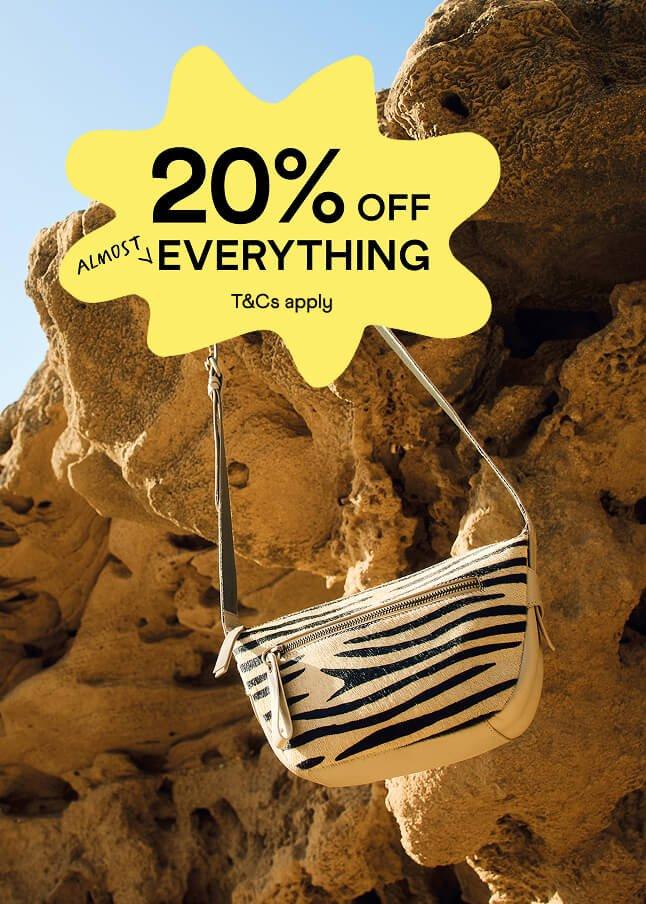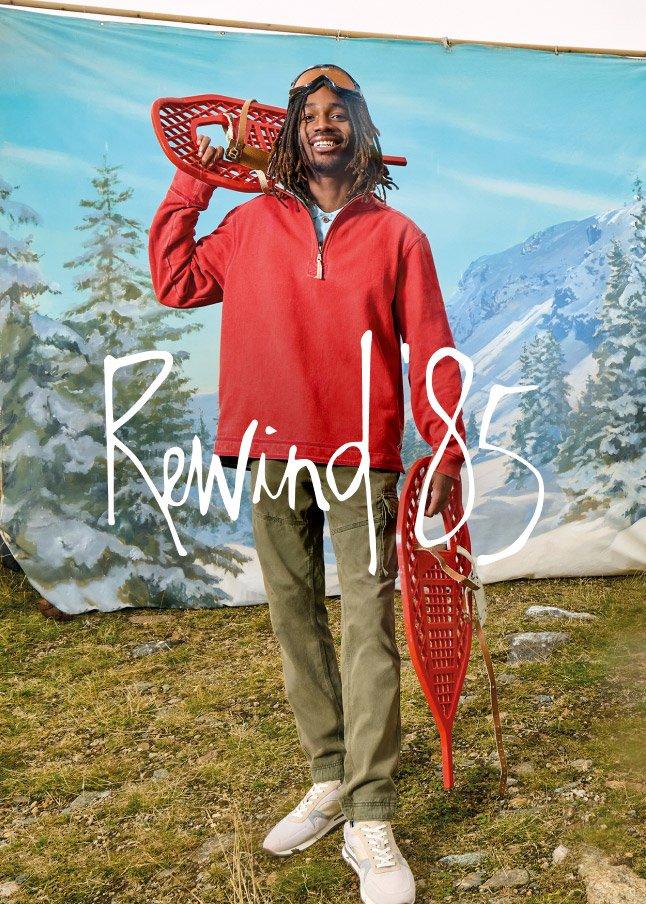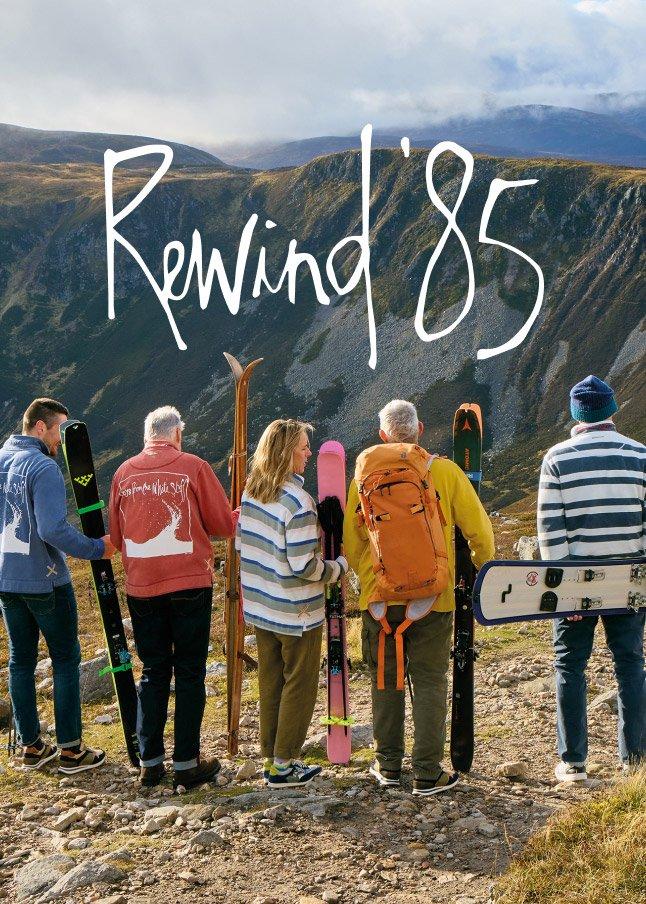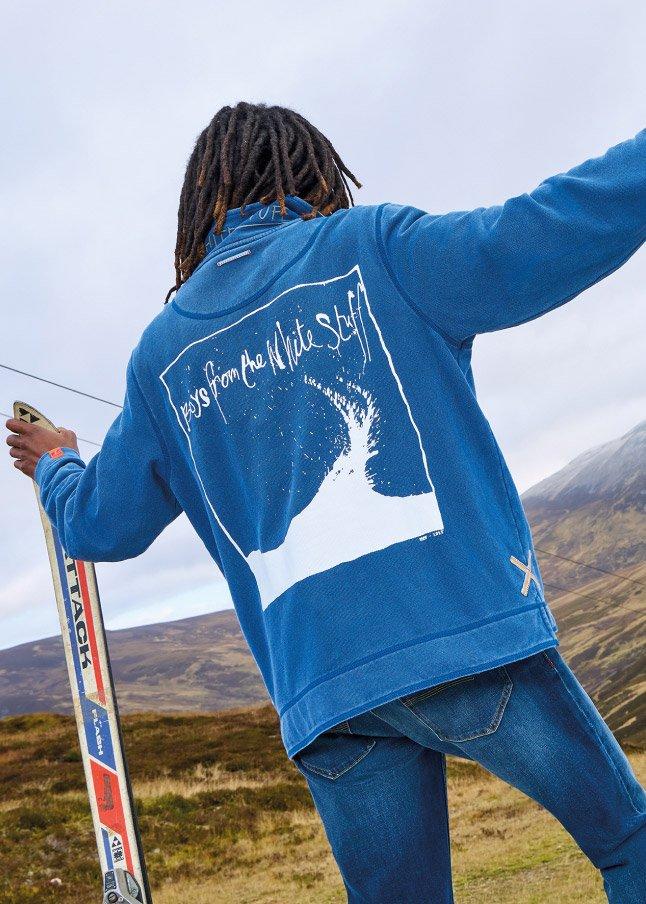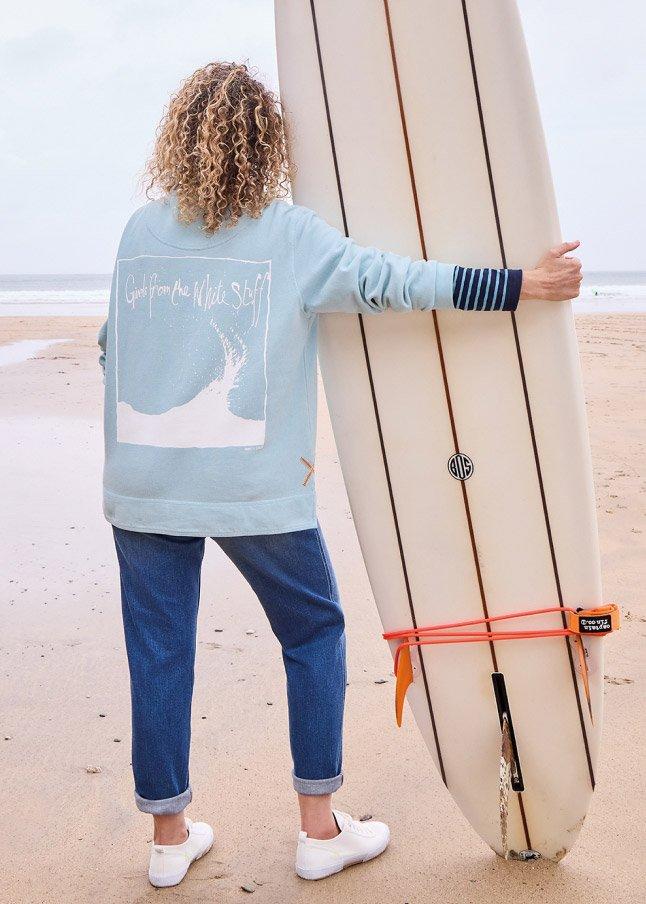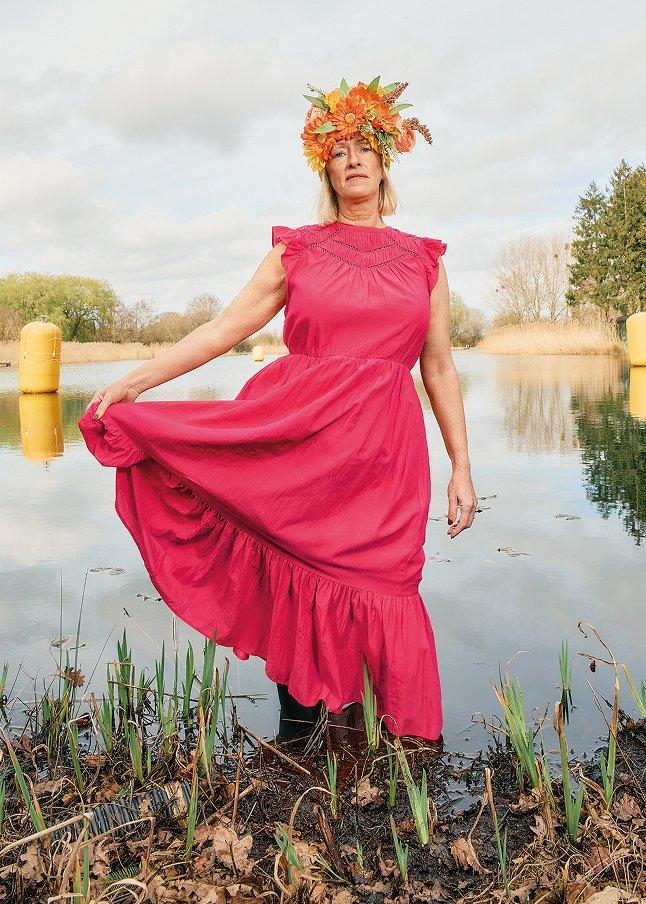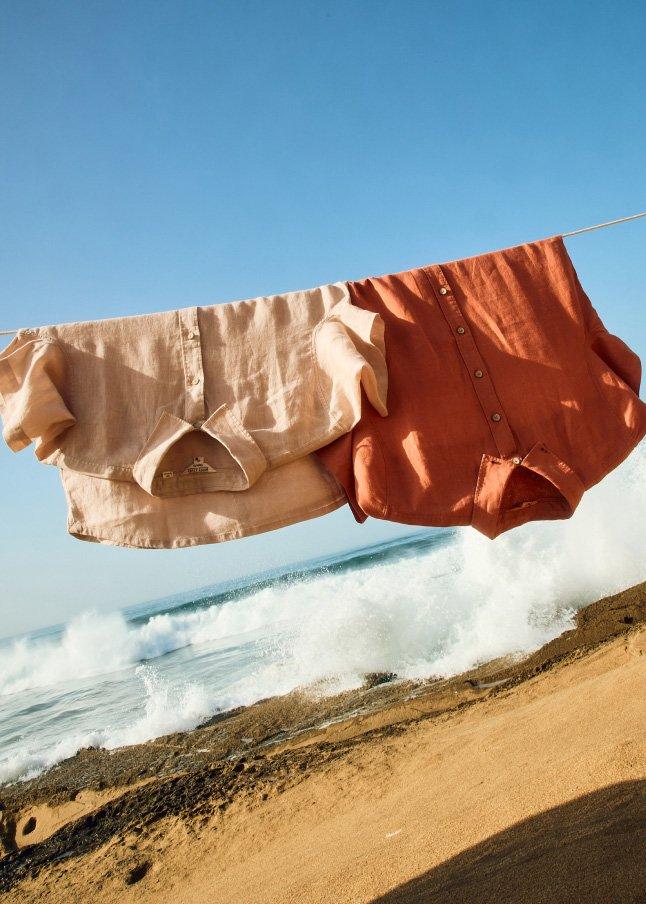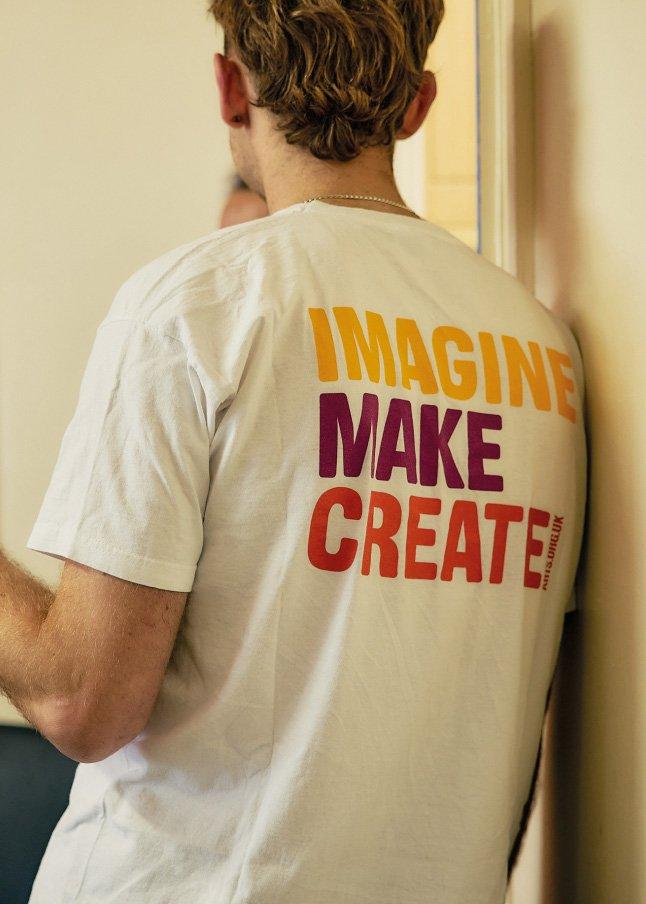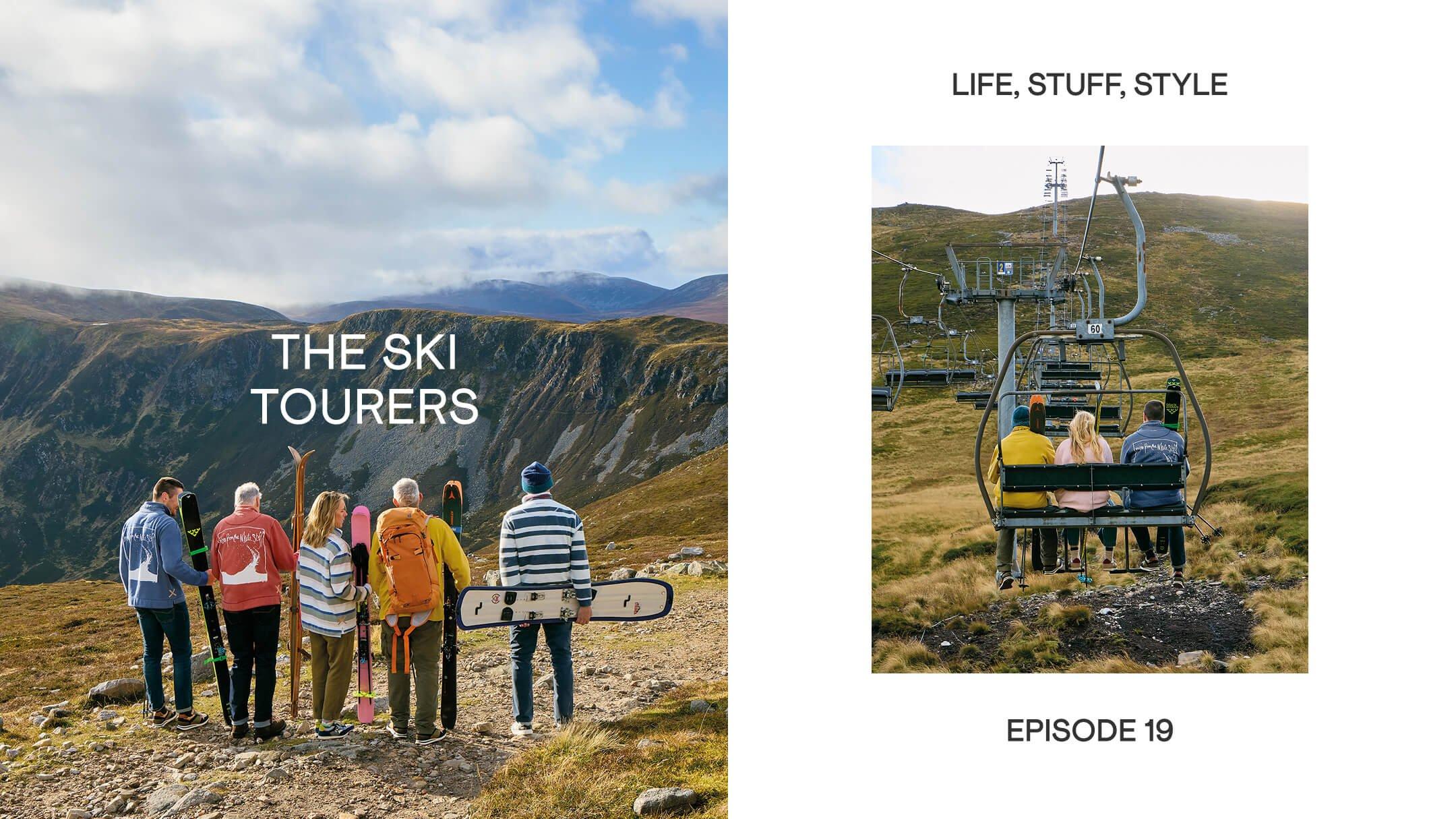
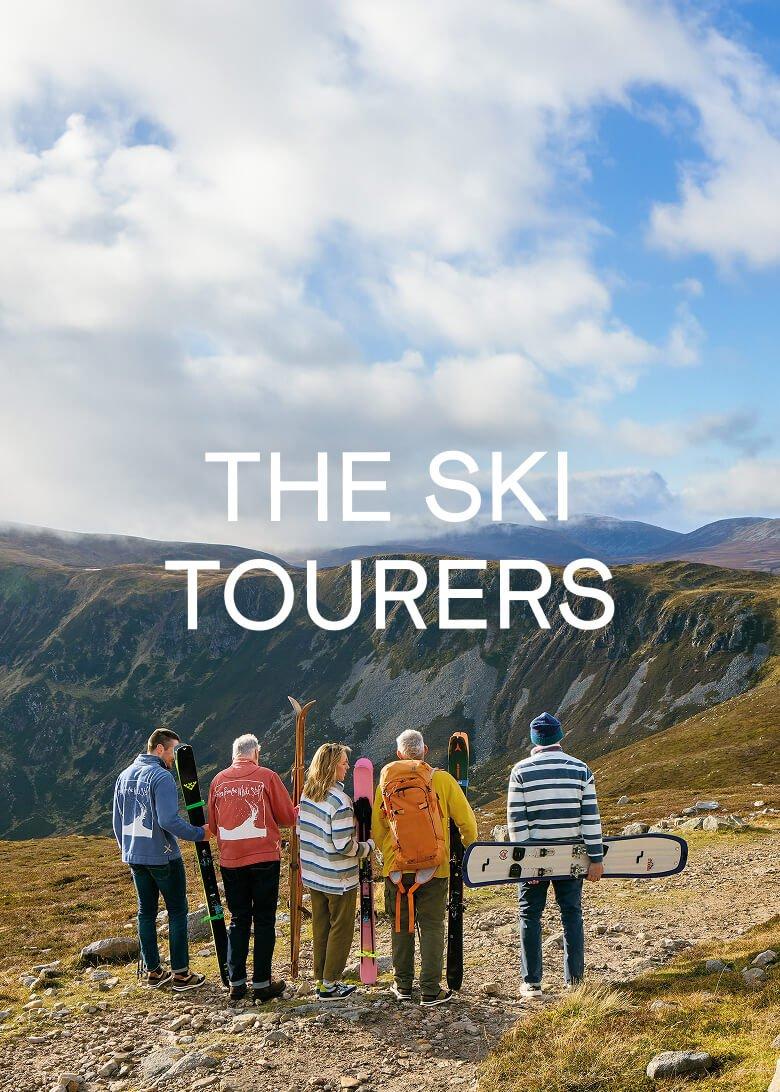
EPISODE 19
THE SKI TOURERS
Heathery, gorse-filled glens flanked by craggy, granite peaks. The biting sub-Arctic wind hits you, as you get out the car, as does the stillness. The emptiness. We’re in Cairngorms National Park, the largest national park in the UK, at Glenshee Ski Resort. It’s October and as it starts to snow, just sprinkles, you can start to picture what the wild, backcountry slopes would look like snow-covered in midwinter. What the Scottish Highlands lack in certainty of weather conditions and bougee après-ski venues, is exactly what makes them so appealing for ski tourers like Sophie, her dad John, partner Duncan and their friends who we meet looking out on the untamed slopes.
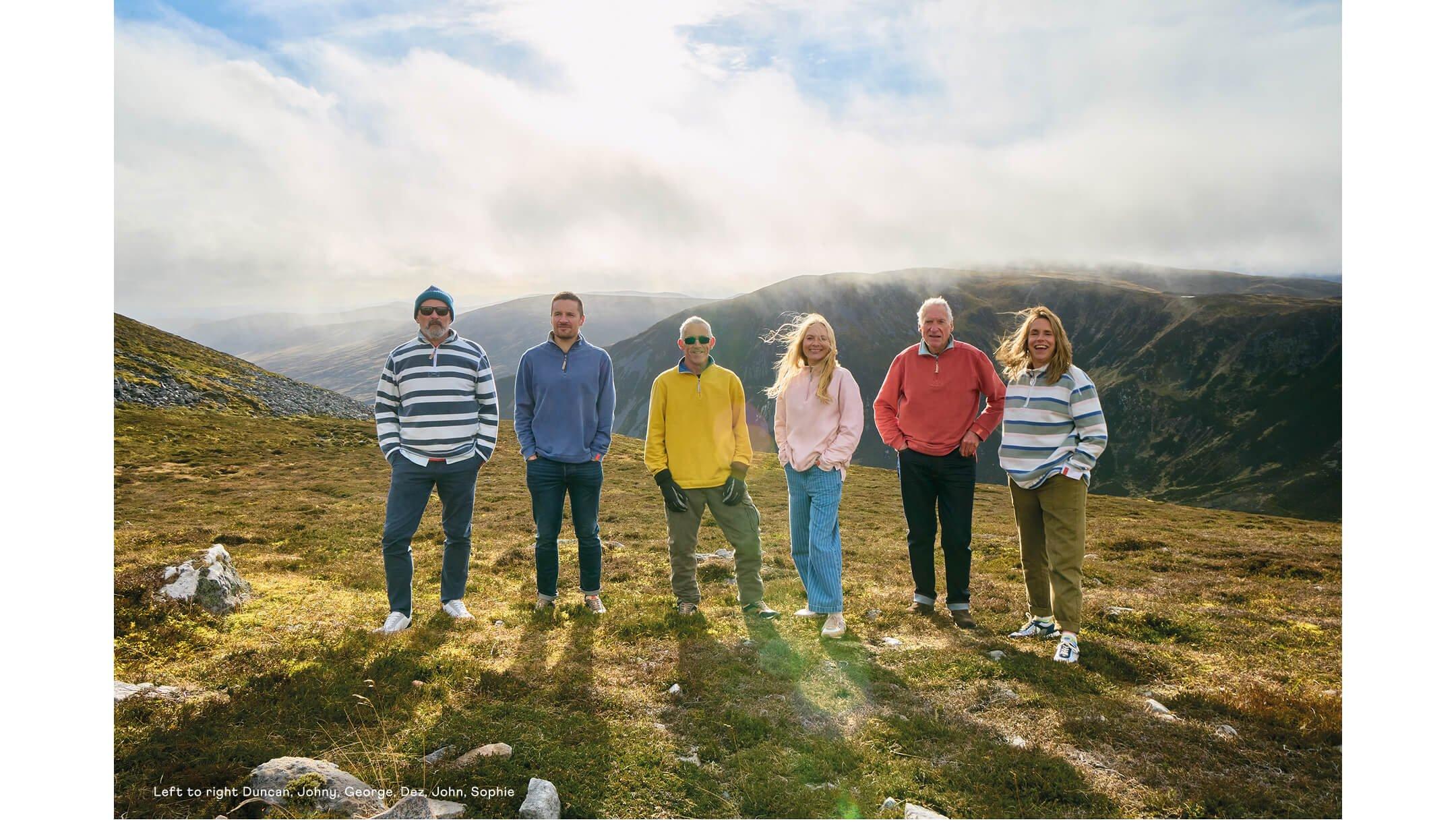
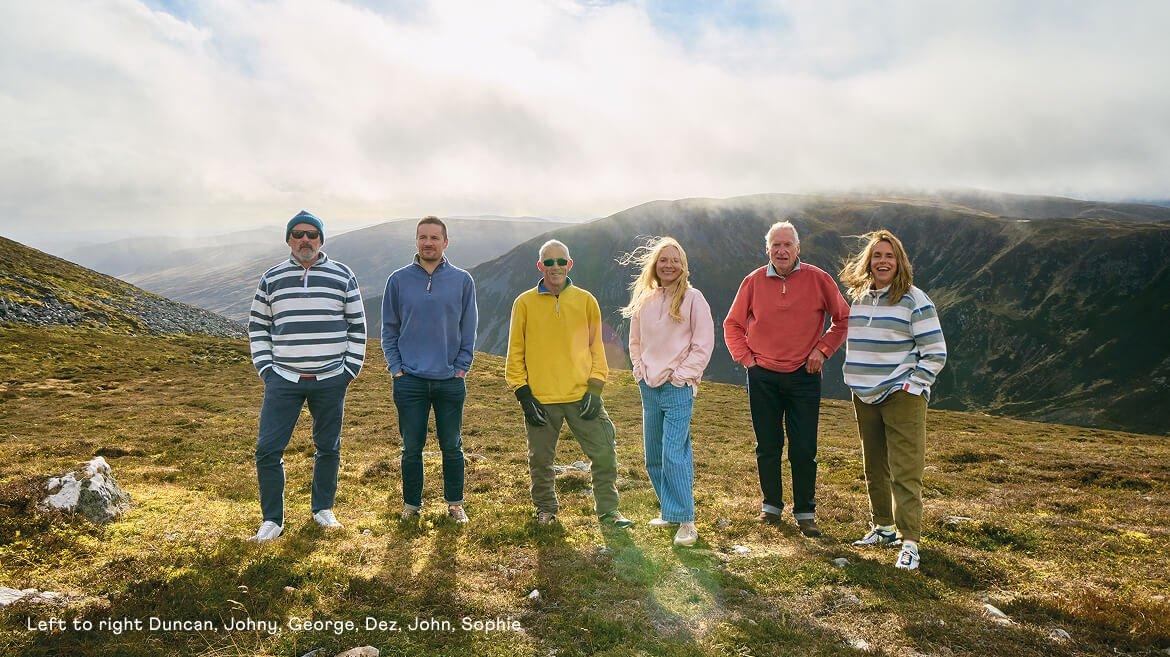
How did you get into ski touring?
John: It goes back a very long way. My father was a great ski tourer and he used to say that when the attraction of piste skiing begins to wane, then I would become interested in ski touring. I was completely against this idea because I was young and loved piste skiing. But he was right. I was in my late 40s when I started.
Sophie: Grandad skied on his 80th birthday, and you’re 80 now, Dad. You’ll definitely keep skiing. I used to ski on the piste and snowboard and then it ran its course for me too, and I was looking for something different. I was going through a period in my life where things were a bit tricky and Dad took me out into the mountains, and it opened up this whole new world of just being in the mountains, as opposed to in a manufactured, prescribed environment of a ski resort. You earn your turns, is what it's called. You hike, you learn about the mountains, you see the wildlife. It's a much more primal experience, and it's one of the most fulfilling things you can do because it takes you into amazing places.
Duncan: In the Highlands as a kid, a lot of people see the mountains as a barrier. But if you are lucky enough to be introduced to the mountains as a playground, it's vast and huge and almost endless.
Johny: I like the feeling of getting absolutely rinsed. Like you get back home and your legs are done because you've been doing so many runs.
Duncan: And there's a good rhythm to it. It's quite meditative. You're constantly assessing the hill, where the winds come from. So there's a connection to the environment that you don't get if you're in a ski area because it's all groomed and prepared.
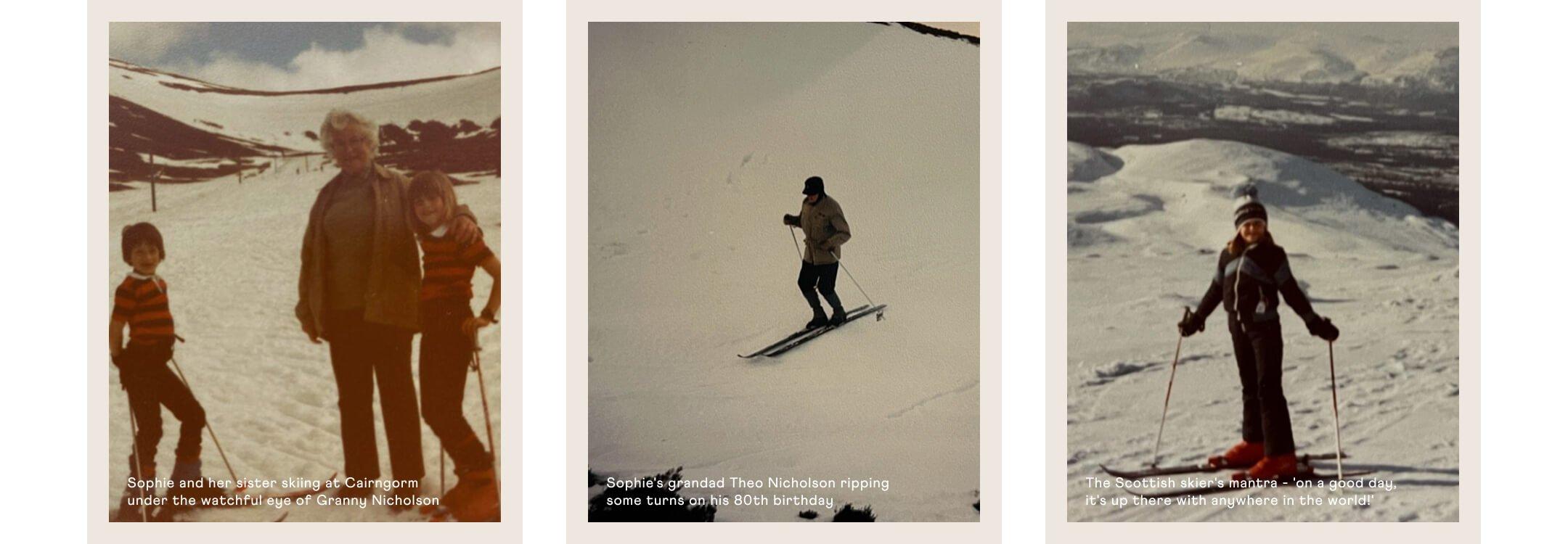

And what does ski touring involve?
Sophie: Ski touring is when you hike up a mountain, wearing your skis, and you ski back down, essentially. And in order to do that, you need special equipment, which is different to the equipment that you need to ski on the piste.
George: One of the joys of skiing is getting fresh tracks, being the first person down a slope. With ski touring, you’ve got the whole slope to select from and put in your own signature.
Sophie: Because if it's from a lift, everybody else has skied it.
Dez: I think part of the appeal for me is the opportunistic element. It's grabbing the chance to do something, like a gully that suddenly comes into condition that hardly ever is.
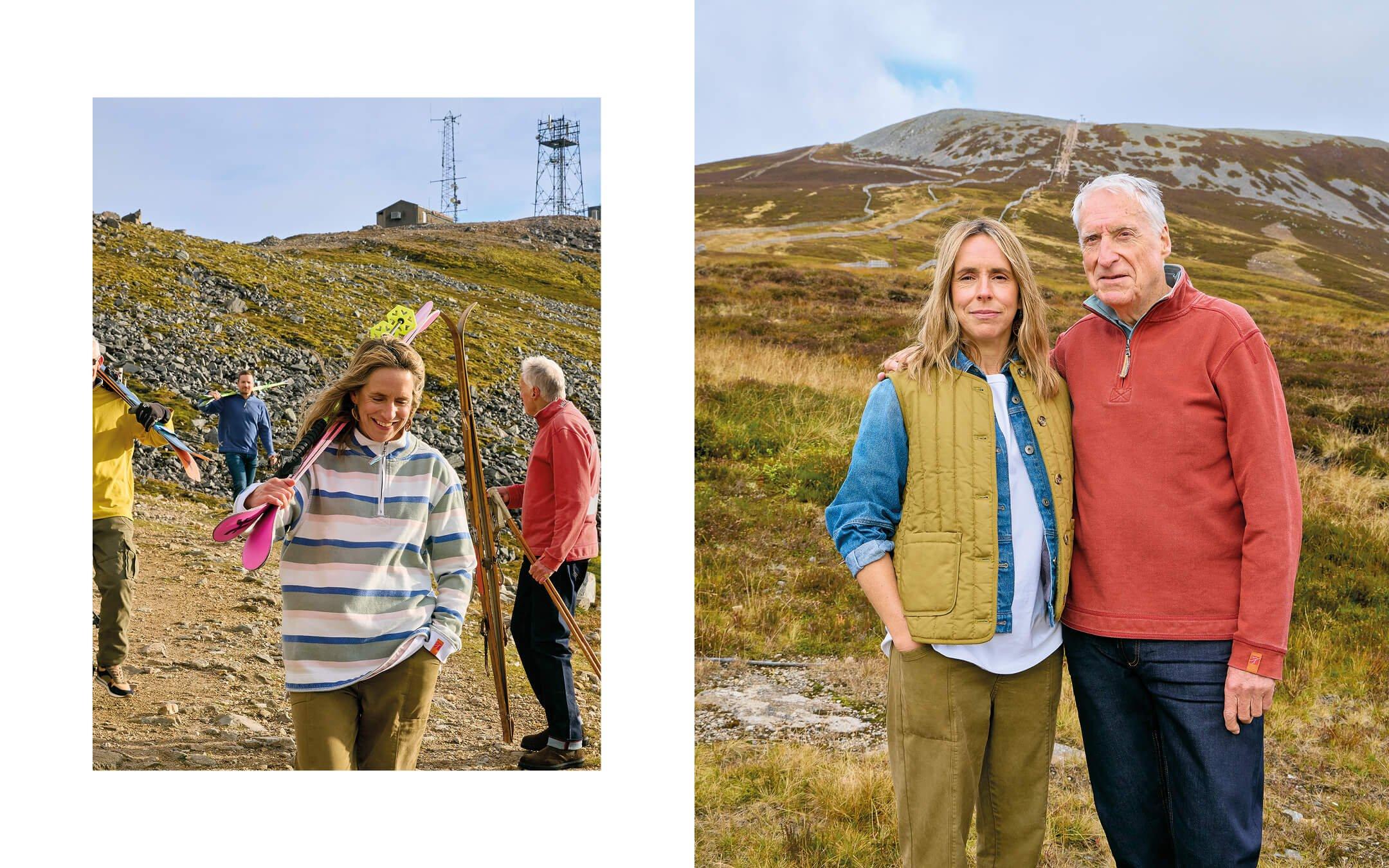
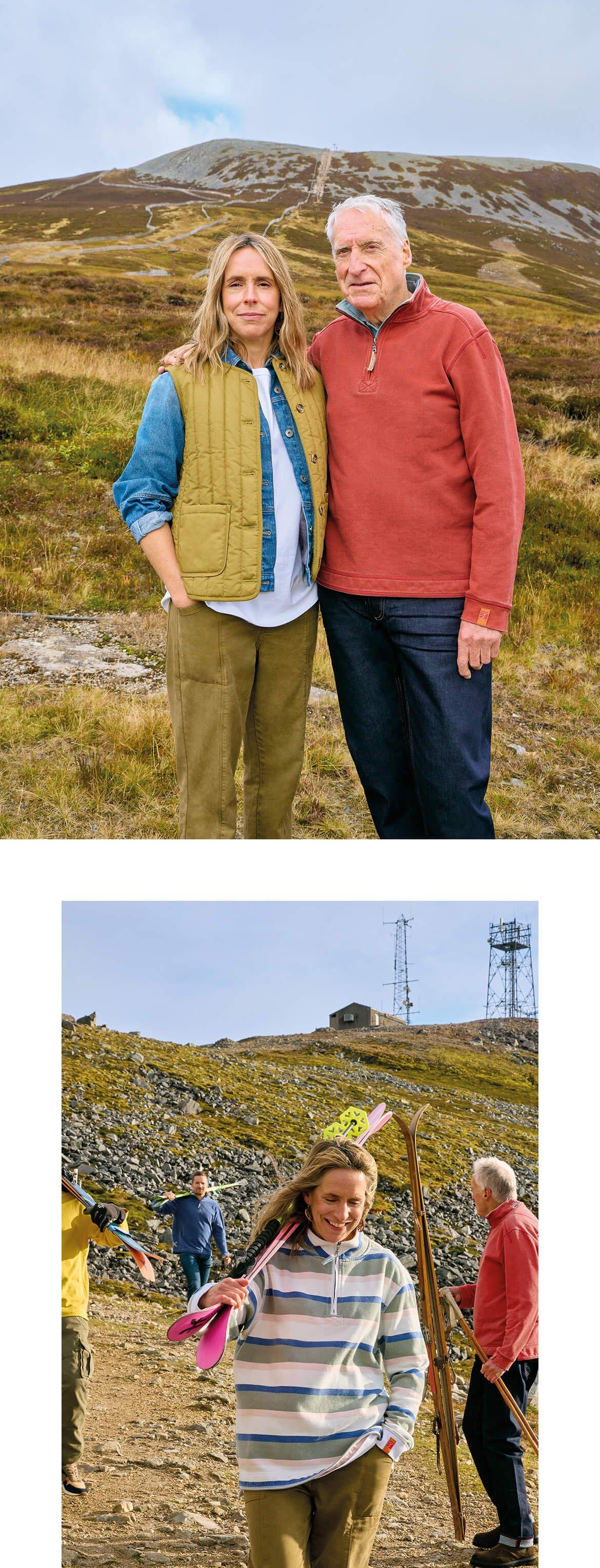
Duncan: There’s raw Arctic element to the winter in Scotland, especially in an area like this, when it's fully covered in snow and the wind's blowing, you could be in Iceland. You can start walking around in the mud and all over the hill. And then at the top, it could be minus 20 and blowing 50 miles an hour. So the changes are enjoyable to cope with, actually. Part of the challenge is coping with that diversity on a daily basis.
Johny: You'll find that when you're sitting there at minus 20 and you're wrapped up, you feel kind of untouchable because you're just so cosy. But you're in an absolutely wild environment that could ruin your life in some way if it goes wrong.
John: You've got to be able to read the hill, read the snow conditions, know the strata of snow, when it's likely to avalanche, make good decisions. It’s a real subject in itself. So it’s advisable if you’re taking up ski touring to go with a guide.
Duncan: Like George, as a mountain guide. He can cut a snow profile and look at the layers of snow that have fallen every single day and he can tell the whole history of a winter in one shovel scoop.
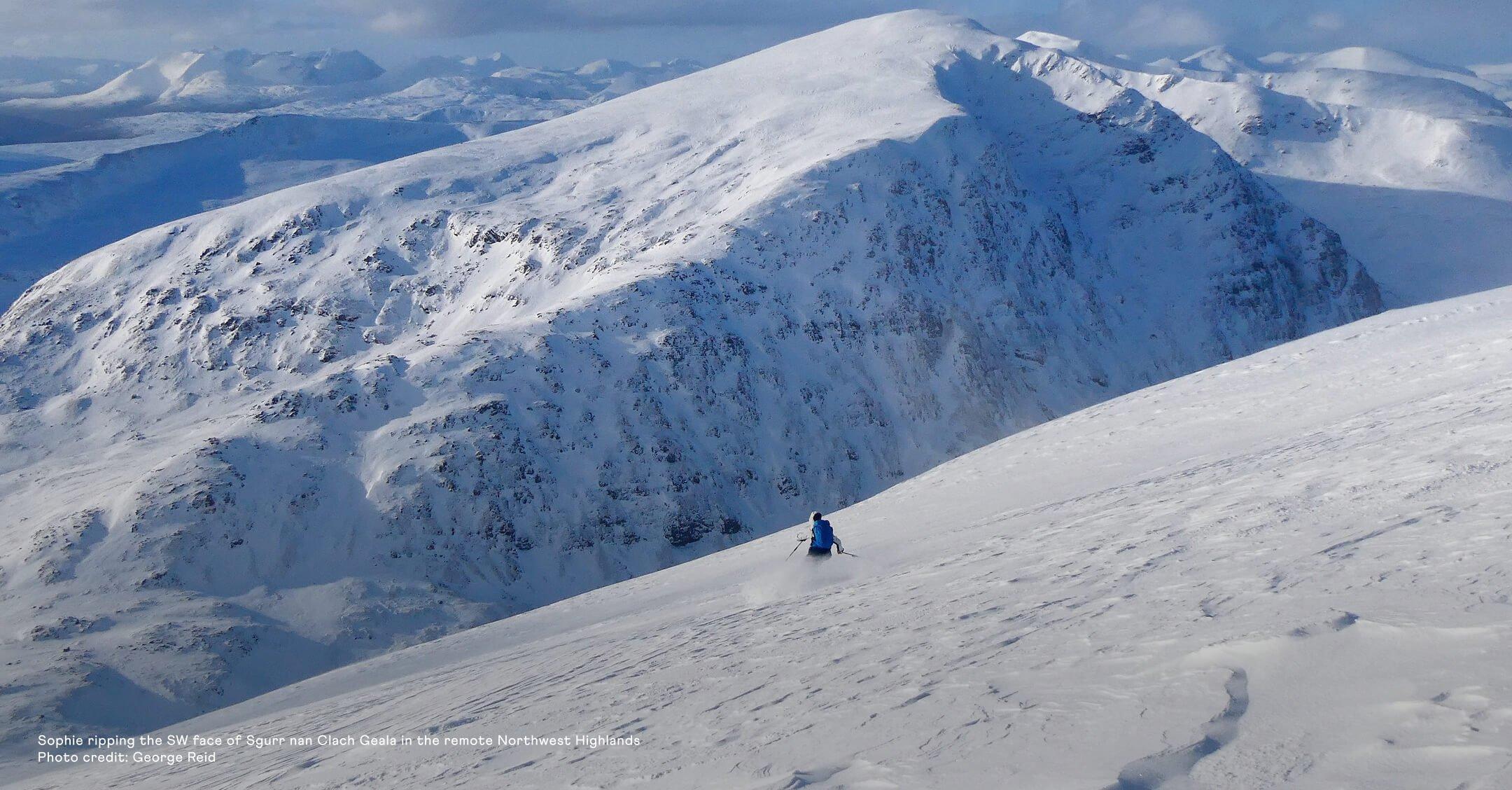
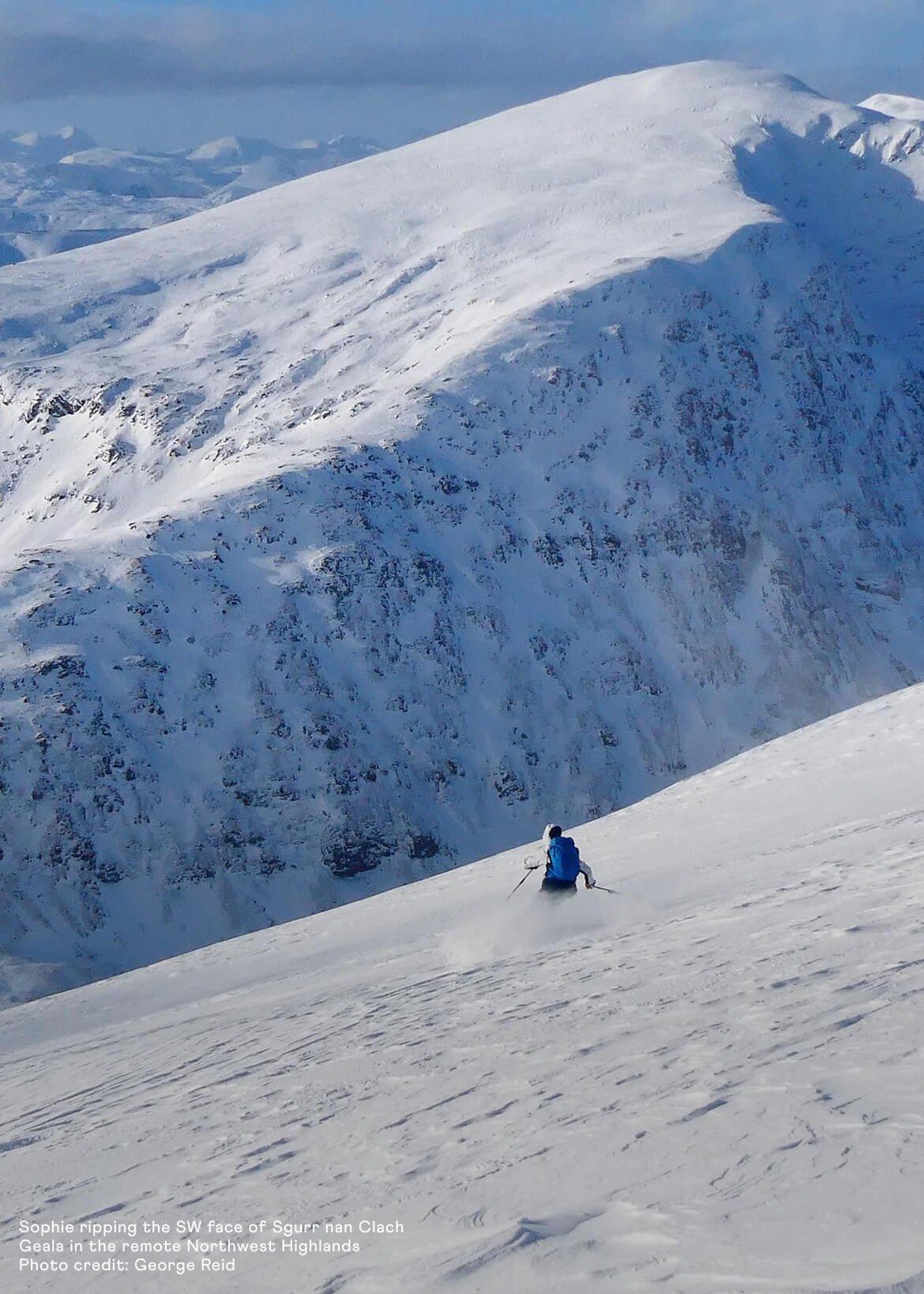
And what makes skiing in Scotland so special?
Sophie: There are preconceptions that everyone thinks the mountains are not very high. And the snow is rubbish. The lifts are slow, the weather's rubbish, all of those things, and they're all completely true. But the thing is, it's a massive cliché, but all Scottish skiers would say if you can ski in Scotland, you can ski anywhere. Because what you do is harder won. It's properly earned, so it has this badge of honour around it.
George: If there’s sufficient snow, the overhead conditions are good and going to remain good, you already feel like a winner, before you even step out of your car. Because it's all come together.
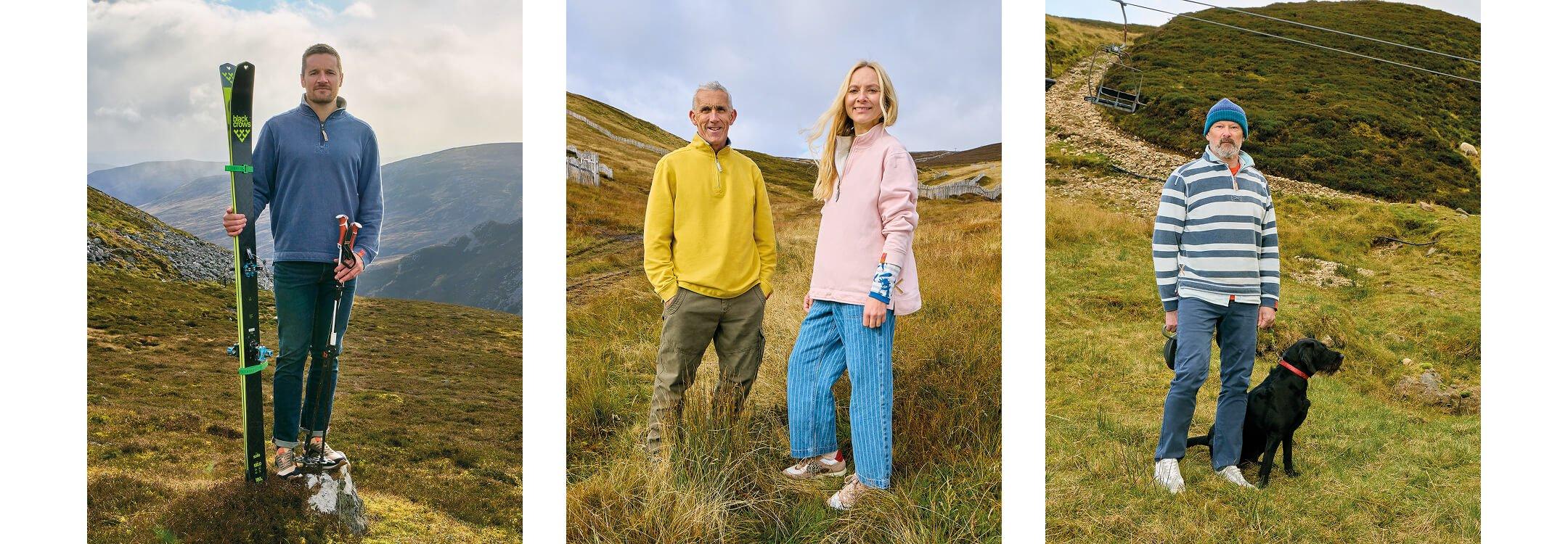

Duncan: We had a day on the last lockdown winter where we got up at 3am and drove for four hours to get to the bottom of a hill, and we had no idea whether it would be in condition or not. And when we were sitting in the car park and the sun was just coming up, we couldn't see any snow. And we walked up and then in front of us was this 10 kilometre slope of completely unbroken, pristine snow with ptarmigan and deer on it. It was just magical. That hill is so rarely in condition, it might only be skied once every four or five years.
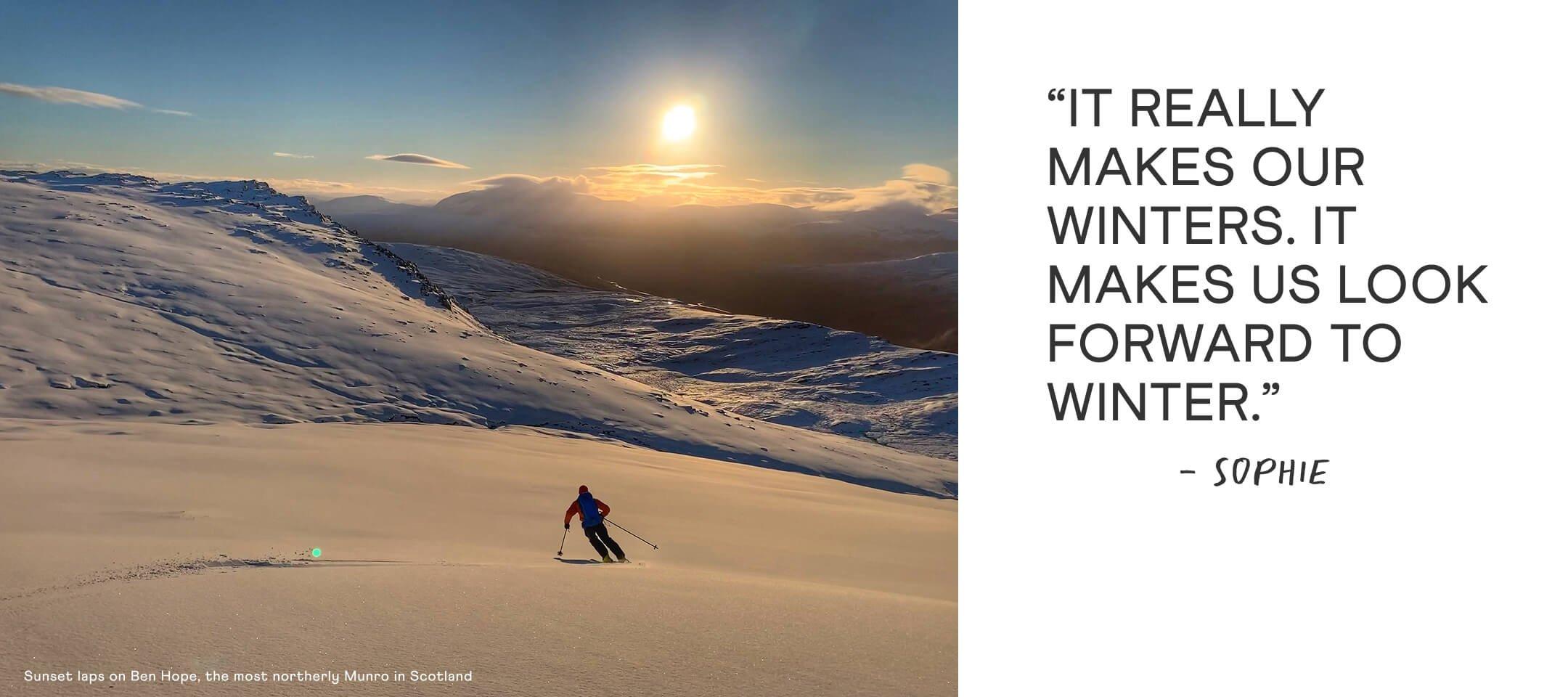
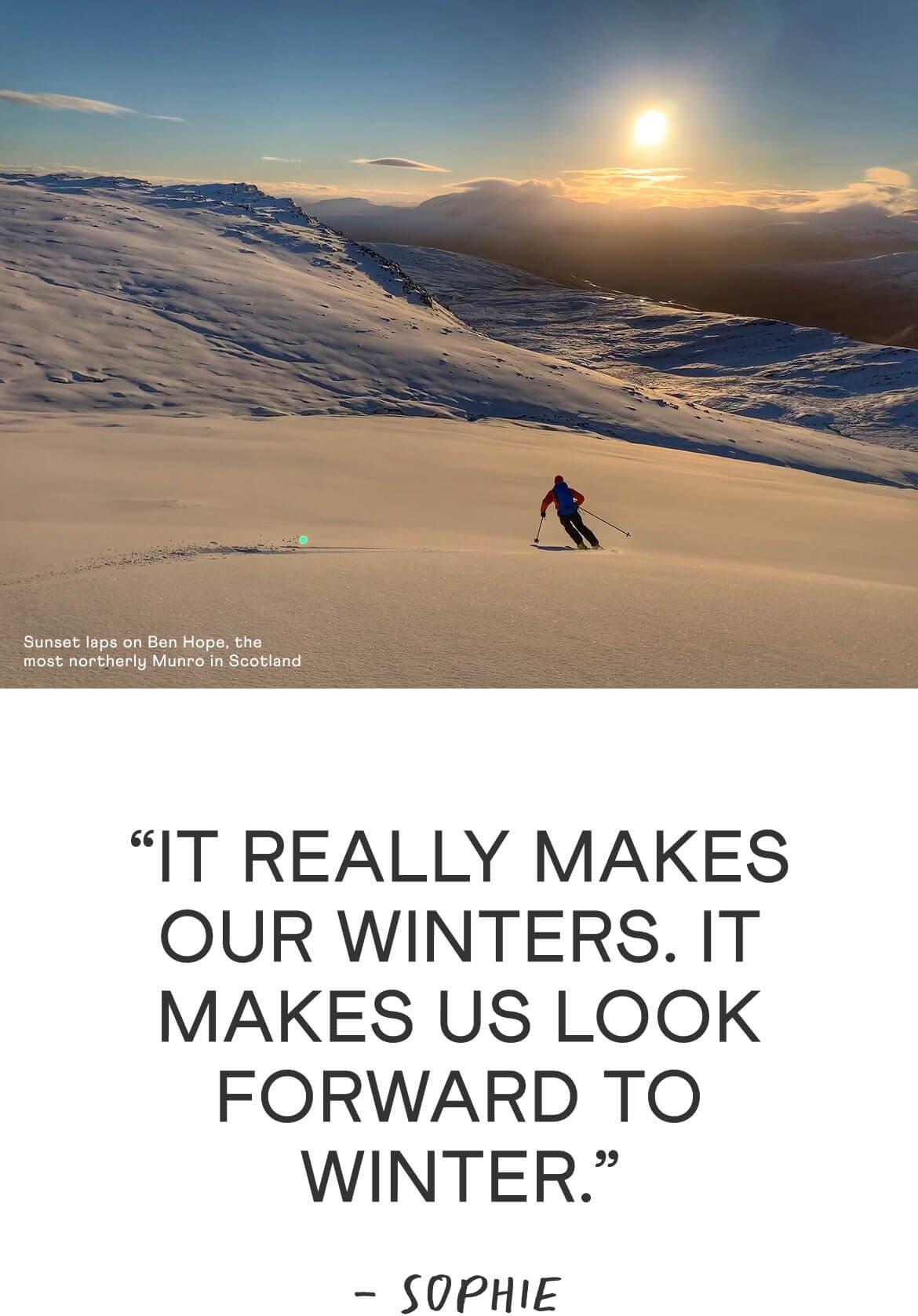
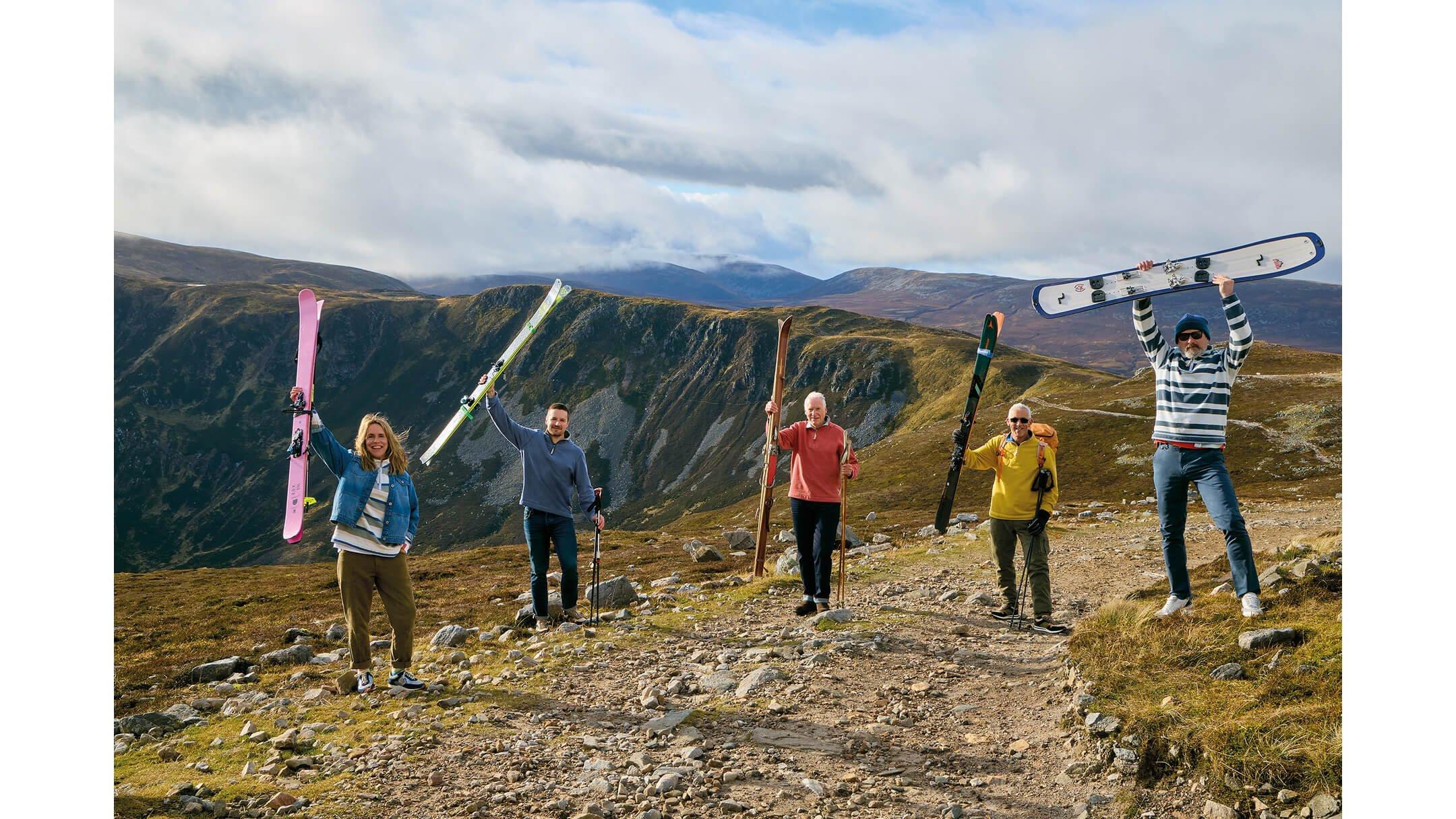
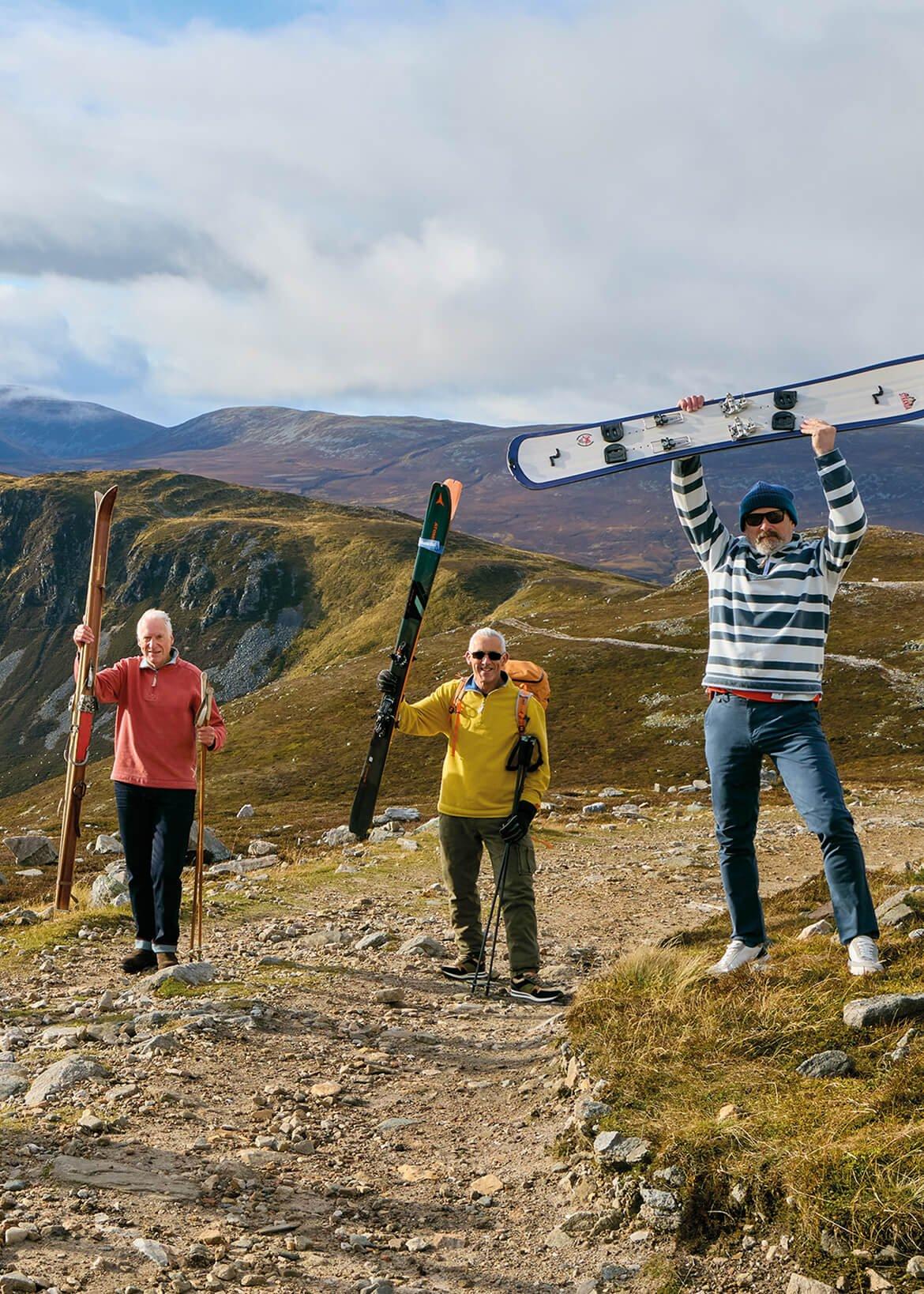
And what do you do post ski?
George: If you were ski touring in the Alps, you’d go to your favourite bar afterwards. But ski touring in Scotland is so remote that after, you just get in your car. For Ben Hope, you're driving for three hours and there is no café. Even the drive there is an adventure. You're going down a road that’s covered in snow and ice. There’s no phone signal so if you went off the road, you’d be there for hours, the next day if you’re lucky, until someone happened to come by.
Duncan: I probably just eat whatever is left in my car afterwards. The half-chewed crust of a sandwich.
Johny: The snacks left in my bag or a Nature Valley bar. After a really long, hard day, they taste like a gourmet meal.
Dez: We talk about type 1 and type 2 fun. When it’s a day where all the elements align, it's definitely type 1 fun. But when it's more effort than you expected, and not very obvious at the time that you're enjoying yourself (but you know it’s rewarding), that’s type 2 fun. But when you’re back home with a cup of hot tea, you'll think it was absolutely brilliant.
George: A type 2 day might be one for a bath after.
Dez: And a large glass of wine.
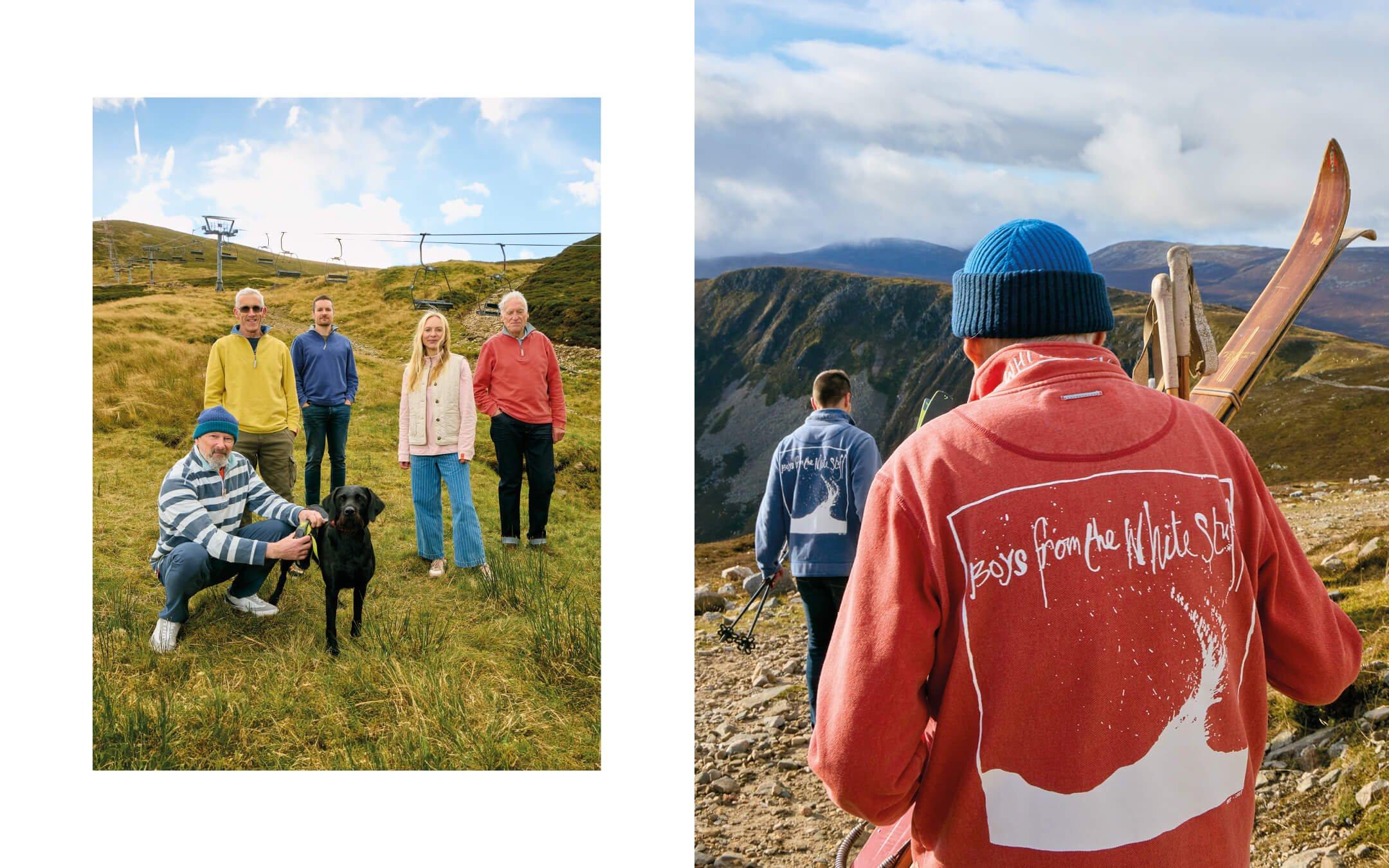
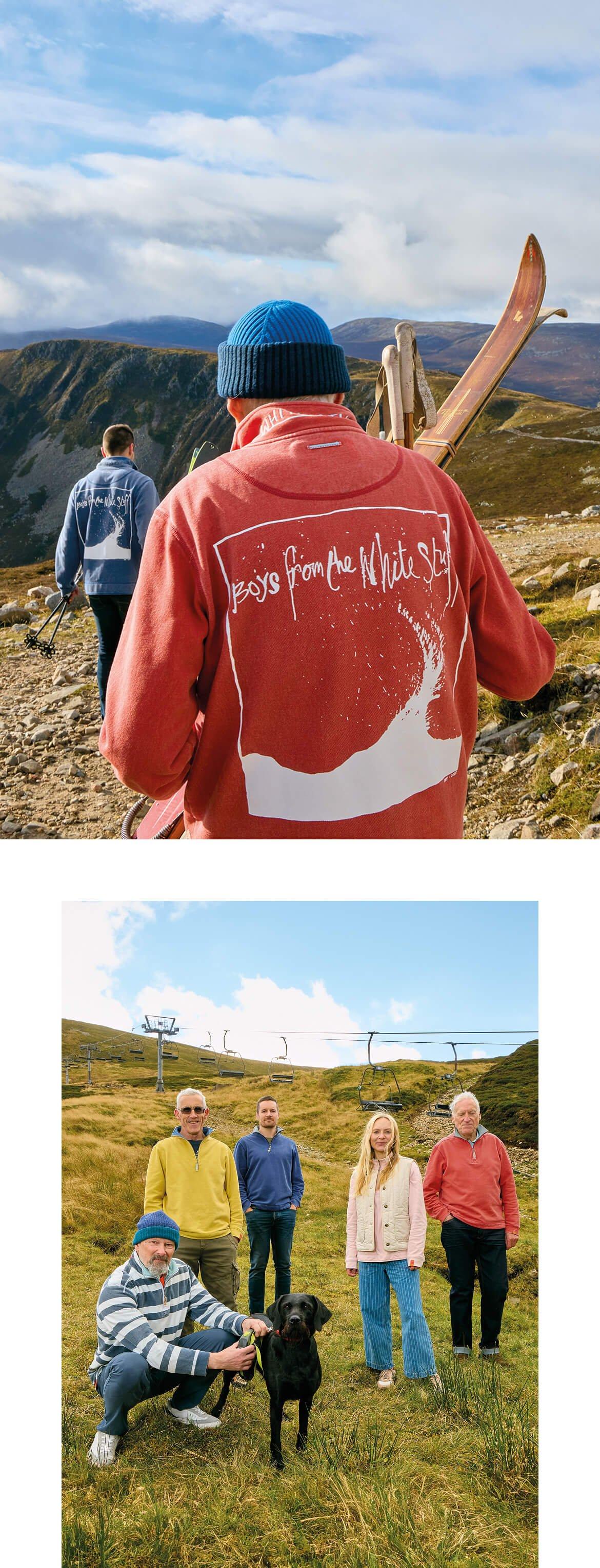
And finally how would you sum up the ski touring community?
Duncan: Small, friendly, motivated.
Sophie: I'd say supportive, stoked and happy. Genuinely.
Johny: I was going to go with friendly, hyped. And everyone's curious. If you hear of a good spot, spend your whole day going to find it, you might get four turns and you’ll still say ‘that was so worth it’.
Sophie: There’s a real feeling of people supporting each other and wanting to share spots where conditions are good. You have this shared bond. It's a very weird thing to want to do, to hike up a mountain for four hours and ski for maybe two, three minutes. But we have this shared connection of this thing we’re into.
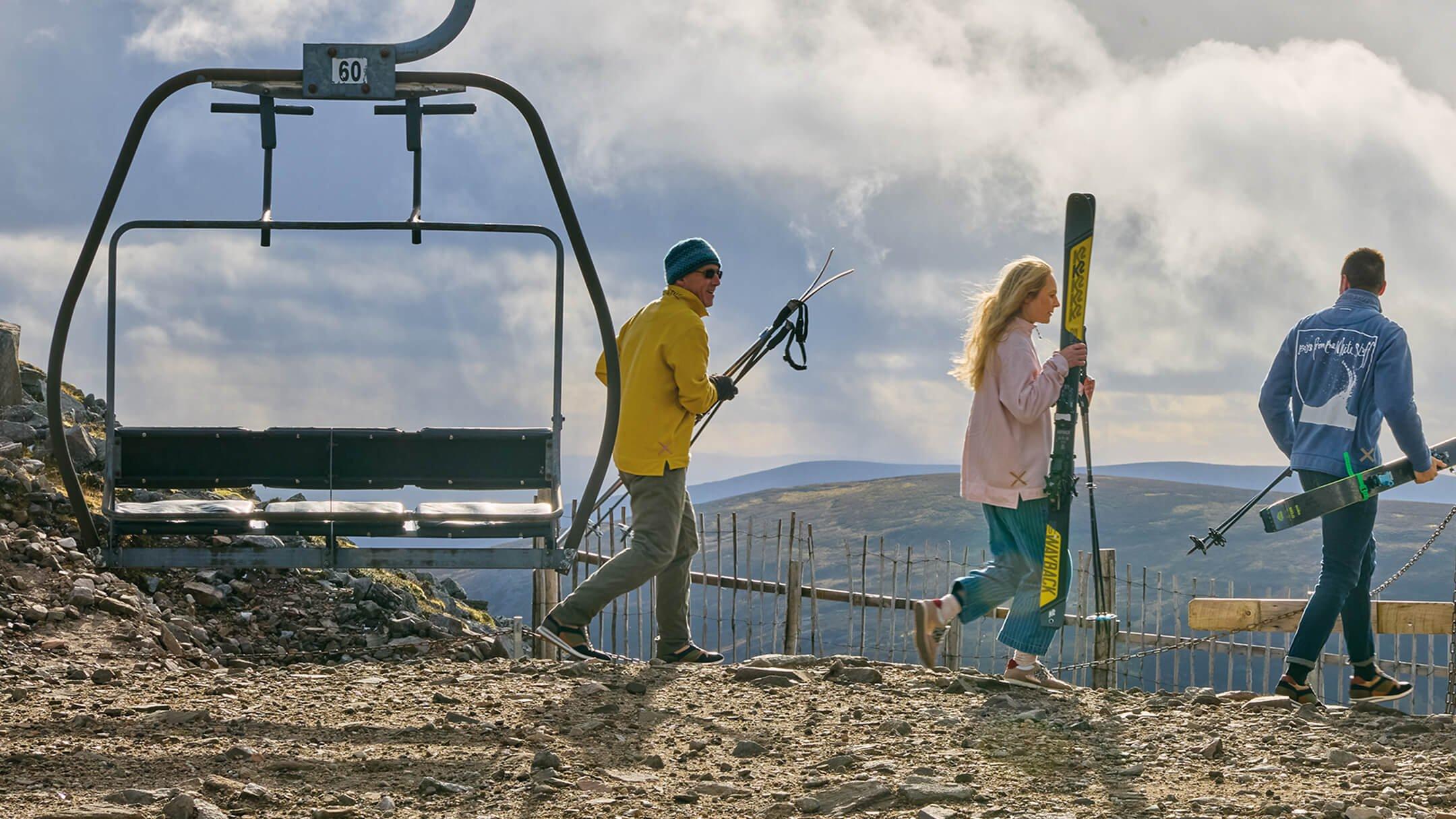
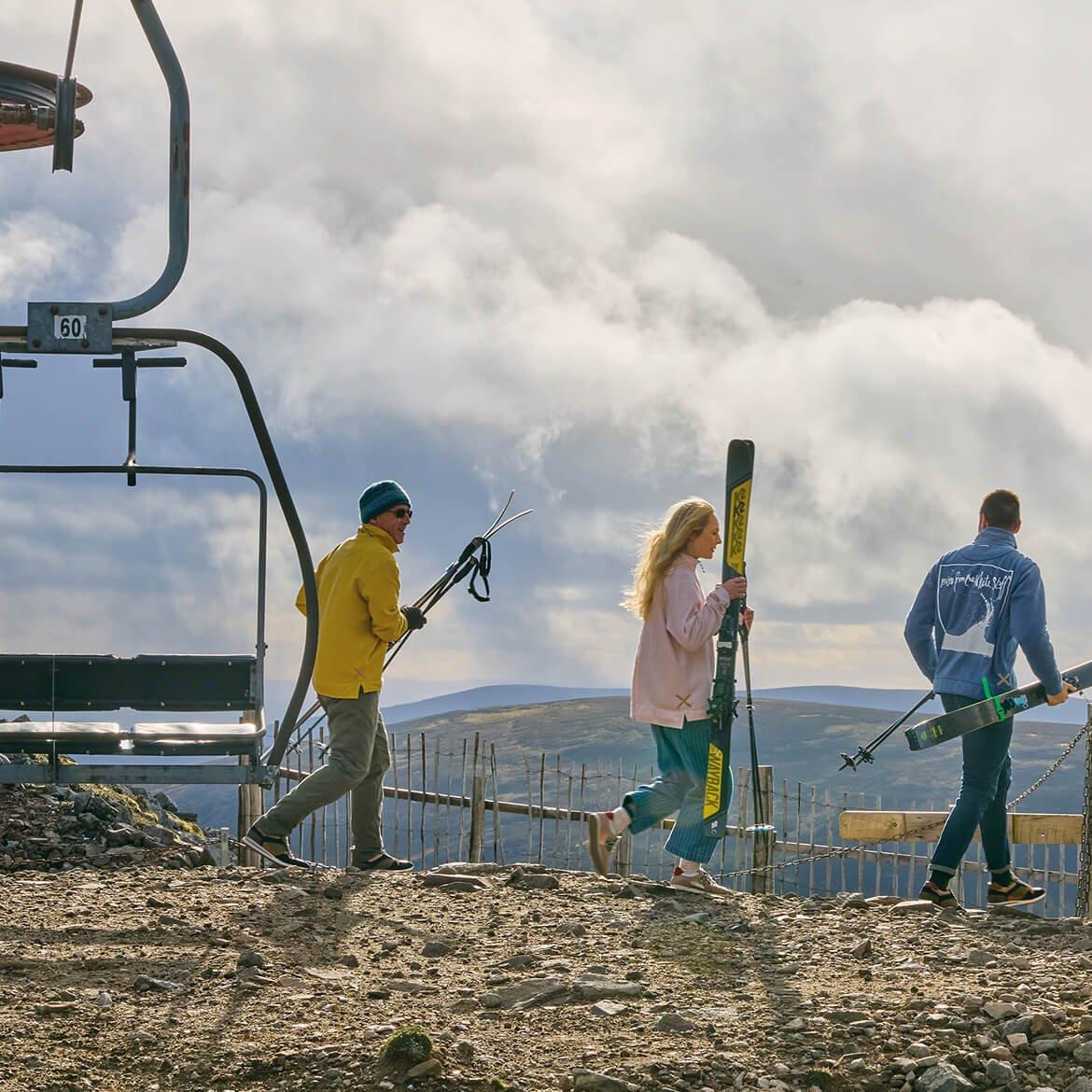
To hear more from our ski touring friends, and see more from the Scottish slopes, head to our social channels.


